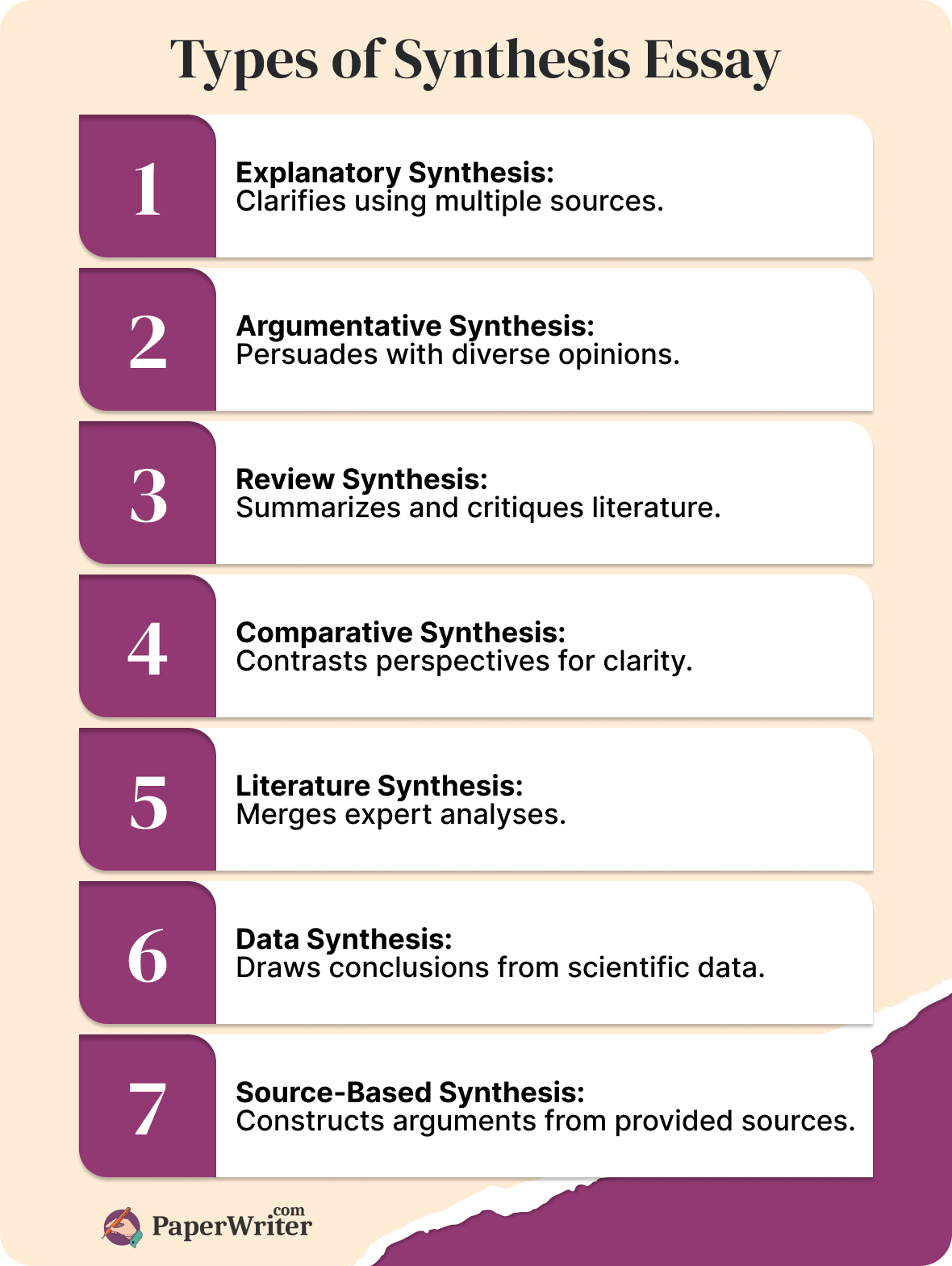As a student, you'll inevitably tackle synthesis essays. Crafting one may seem discouraging at first, by understanding the basics, you'll realize it's not as complex as it seems.
So, if you're tasked with merging articles and book excerpts into a strong argument, don't fret. With the right approach, you can transform these sources into valuable assets for your essay. In this article, our college essay writing services will guide you through writing a good synthesis essay by understanding its various types and mastering the right structure.
What is a Synthesis Essay?
A synthesis essay is a type of school paper where you blend different sources to create a solid argument or viewpoint. Unlike some essays that focus on summarizing or arguing, a synthesis essay requires you to carefully examine and combine many sources to develop a detailed perspective.
Simply put, a synthesis essay is like a playground for intelligent discussions with various texts, such as academic articles, studies, stories, or historical documents. Instead of merely presenting one side of the story, you delve into each source and identify common themes, differences, and connections.
If you're wondering how long is an essay, it hinges on different factors, but typically, we figure it should span around 5 double-spaced pages. This is because your primary task as the writer is to select, evaluate, and integrate information to construct your own unique argument. This involves not only identifying what's important and reliable from each source but also considering any biases or assumptions they may contain. That's why you require ample space for analysis.
Overall, a synthesis essay encourages you to move beyond simply repeating what others say. By blending these diverse sources, your goal is to create something new and insightful that exceeds the sum of its parts.
Types of Synthesis Essay
Now, let's look at the different kinds of synthesis essays:

- Explanatory Synthesis Essay: This type aims to help people understand a topic better by bringing together information from many sources. Writers study these sources to give a clear picture of the topic, explaining complex ideas or things to the readers.
- Argumentative Synthesis Essay: Here, writers mix different opinions to build and support a convincing argument. By using evidence from various sources, they try to convince readers that their side of a debate or argument is right.
- Review Synthesis Essay: This kind blends together existing research or literature on a specific topic to give a complete overview or criticism. Writers combine insights from many sources to judge what we already know about a topic, find any missing pieces, or suggest what we should study next.
- Comparative Synthesis Essay: Writers compare multiple sources to show similarities, differences, or patterns across different perspectives, theories, or methods. This type of essay helps us understand a topic better by looking at different viewpoints side by side.
- Literature Synthesis Essay: Often used in studying literature, this type combines interpretations or analyses from different experts.
- Data Synthesis Essay: This type is common in science or social science research. Writers combine data from many studies or experiments to draw big conclusions or find trends in a certain field.
- Source-Based Synthesis Essay: In some academic tests like AP exams, students might have to write a synthesis essay based on given sources. Writers use these sources to make a clear argument or answer a specific question.
Synthesis Essay Got You Worried?
Trust our expertise - we'll skillfully integrate sources into your paper.

Synthesis Essay Structure
Let's break down how a synthesis essay usually looks. And if you're in a hurry, you can always ask us - write a paper for me. We're here to make things easier for you!
Introduction:
- Hook: Begin with a compelling opening that grabs the reader's attention and introduces the topic.
- Background Information: Provide contextual information about the topic, including its relevance and significance.
- Thesis Statement: Clearly state the main argument or perspective you will be synthesizing from the various sources.
Body Paragraphs:
- Topic Sentence: Start each paragraph with a clear topic sentence that previews the main point or idea to be discussed.
- Source Integration: Introduce each source and its author, providing a brief summary or overview of the main ideas presented.
- Analysis and Synthesis: Analyze how each source contributes to the overall discussion, identifying common themes, contrasting viewpoints, or connections between sources.
- Transitions: Use transitional phrases to smoothly transition between sources and ideas, maintaining coherence and flow throughout the essay.
Counterarguments (optional):
- Acknowledge and address potential counterarguments or alternative viewpoints that may challenge your thesis.
- Provide evidence or reasoning to refute opposing perspectives while strengthening your own argument.
Conclusion:
- Restate Thesis: Recapitulate your thesis statement, summarizing the main argument or perspective synthesized in the essay.
- Summary of Key Points: Provide a concise summary of the main points discussed in the body paragraphs, emphasizing the significance of the synthesized information.
- Closing Statement: End with a thought-provoking closing statement that reinforces the importance of the synthesized argument or offers implications for further research or consideration.
References (if required):
- Include a list of all sources cited in the essay, formatted according to the appropriate citation style (e.g., APA, MLA).
Revision and Proofreading:
- Review your essay for coherence, clarity, and logical progression of ideas.
- Check for grammatical errors, punctuation mistakes, and inconsistencies in formatting.
- Seek feedback from peers, instructors, or writing tutors to refine your synthesis essay further.
How to Write a Synthesis Essay?
When you're writing a synthesis essay, your job is to bring together different sources of information to build a strong argument. Here are some steps you can follow, or you can choose to pay for college papers so our experts can quickly complete them for you.
First off, introduce the texts you're using by mentioning the author and title and giving a brief summary of each. This helps your readers understand where you're starting from and where you're going.
There are a few ways to organize your essay effectively. One way is to break down your argument into different points and see how each source contributes to these points. Another way is to look at each source individually and see what they say about the topic before moving on to the next one. You can also compare one text to another, which can bring out interesting insights.
When you're incorporating sources into your essay, make sure it all flows well and is easy to understand. Use quotes, paraphrases, and summaries to support your own ideas, and make sure to explain how each source is relevant to your argument.
For example, if you're writing an essay about climate change, you could compare scientific research on rising temperatures with suggestions for policies from environmental groups. By looking at these sources together, you can show what scientists agree on and also explore potential solutions.
In your conclusion, bring everything together and talk about why it matters. Summarize the main points you've made and talk about how they're connected. Also, think about what your analysis adds to our understanding of the topic and suggest ideas for future research or action.
To help your essay flow well, use transition words like 'furthermore' or 'however' to show how your ideas are connected. Start each paragraph with a topic sentence to let readers know what you'll be talking about.
3 Major Tips for Writing a Synthesis Essay
When it comes to writing a synthesis essay, these 3 tips from our dissertation writer should guide you effectively:

- Clarify Your Purpose and Craft a Strong Thesis: Before diving into your essay, take the time to understand your purpose. What are you trying to argue or convey? Your thesis, the main claim of your essay, should reflect this purpose clearly. It acts as a roadmap for your readers, guiding them through your argument.
- Carefully Select and Analyze Your Sources: Choose your sources wisely and become familiar with them. Don't just quote them; evaluate their relevance to your thesis and supporting arguments. If you fail to assess your sources critically, your essay may lack control and clarity. By analyzing each source, you can effectively integrate them into your argument and avoid misinterpretation.
- Create a Thoughtful Organizational Plan: Organize your essay in a strategic manner. Rather than relying on just one source per point, incorporate multiple sources to bolster your credibility. Consider how these sources interact with each other—do they agree or disagree? Evaluate their logic and credibility to determine their impact on your argument. By developing a coherent organizational plan, you can effectively demonstrate the relationship between your sources and thesis.








.png)
.png)
.png)
